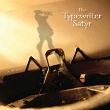The Typewriter Satyr
May 25th, 2010THE TYPEWRITER SATYR by Dwight Allen (University of Wisconsin Press, 2009) is about what happens when a fifty-two-year-old typewriter repairman named Oliver Poole meets a thirty-one-year-old community-radio deejay named Annelise Scharfenberg. The story is set in a small-townish, make-believe Wisconsin city called Midvale (”hilariously mirroring,” as one blogger has noted, “Madison’s blend of corporate pragmatism and pothead eccentricity”). Among the characters who move in and out of the lives of the two lovers are a homeless memoirist named Wade and a Buddhist monk who grew up in rural Wisconsin leading tours of the family cave.
The novelist Michelle Huneven, the author of ROUND ROCK, JAMESLAND, and BLAME, says of THE TYPEWRITER SATYR that
This novel of damaged souls falling in and out of love speaks to the powerful tides of longing and loneliness surging through all of us.

The Typewriter Satyr
In a review in the Chicago Sun Times (March 22, 2009), Mary Houlihan wrote:
Allen has a wonderful way of capturing the essence of each character, even the lesser ones. . . . But it is Annelise who is the book’s most complex character. She was sexually abused as a child, so she teeters away from long-lasting commitments. She’s a sometime student of Buddhism who never lets up in a search for her better self. It’s a forthright journey that she doesn’t tiptoe around. ‘Annelise had to admit that most days she was addicted to the hope that weed and sex and doughnuts would make her feel better,’ Allen writes. ‘What she lacked was faith that she might actually be a decent person, despite her mistakes and cravings and history.’
In a review in the St. Paul (Minn.) Pioneer Press (Dec. 4, 2009), Mary Ann Grossmann wrote:
This bittersweet, compassionate love story will capture you from the first paragraph. . . THE TYPEWRITER SATYR deserves national attention.
THE TYPEWRITER SATYR was a finalist for the Midwest Book Award in fiction and was the Honorable Mention (runner-up) in the Council for Wisconsin Writers Anne Powers Fiction Award. (Valerie Laken’s DREAM HOUSE was the winner of the CWW award.)
Excerpt:
The monk said, “If you feel your mind becoming distracted, gently bring it back to your breathing. Follow the stream of air as it enters your nostrils and flows into your body. When it leaves, feel it warm the tips of your nostrils.”
Annelise–seated on a pillow on the floor, which was uncomfortable but probably not much less uncomfortable than the slat-bottomed wood chair where Oliver, whose hip and leg were inflamed with sciatica, sat–tilted her face up an inch and inhaled. The class was held in a low-ceilinged second-story room above a downtown New Age book-and-notions shop. Two of the windows were open–though not widely enough; Annelise was sweating–and sounds from the street floated in, along with the Midvale air, which on this night in late August contained bus fumes, marijuana, stir fry, cooling concrete, beer, horse droppings, and a tincture of slaughterhouse. (Annelise’s nose was such that if you kissed her after, say, sealing an envelope, as Rolf did the other day, she would smell the envelope glue as well as what you had for lunch and anybody else you had thought about kissing within the past forty-eight hours.) The heavy air made Annelise feel irritable. How nice it would be if a storm blew in. She wished fall would hurry up and come, wished for cool air from afar to prickle her scalp and wipe her head clean, so that she might begin to make decisions. Should she stay with Rolf, whom she didn’t really love, though maybe he was the best she’d find before she turned into a crone–Rolf, who for all she knew was seeing someone at his office? Or should she move out and wait for Oliver, shallow-pocketed Oliver who had four children hanging all over him, who was already receiving mailings from the AARP–Oliver, with whom she had been in love for more than a month, with whom she had been betraying Rolf for more than a month, with whom she’d read aloud “How the Camel Got His Hump” one night last week after fucking him so hard she thought she’d hurt him?
She breathed. She remembered a phrase from “How the Camel Got His Hump”–”In the beginning of the years, when the world was so new and all”–and then she saw herself standing under a blue fall sky, bluer than any wish could make it, shivering a little, right at the edge of the world, not a single other human being within sight. Would she ever be able not to be afraid while standing alone?
–from Chapter 4 of THE TYPEWRITER SATYR By Dwight Allen

October 23rd, 2011 at 3:25 pm
Hi, Dwight. I very much enjoyed your reading with Larry Watson at the Wisconsin Book Festival. I blogged the event here:
http://coffeespew.org/2011/10/22/larry-watson-dwight-allen-at-the-wisconsin-book-festival/
I remember a Cap Times photo of you around the time Judge was published, and visible on your bookshelf in the background was a copy of Infinite Jest. It stood out at the time because I was, and am, a big fan of David Foster Wallace’s novel. So I got a kick out your remark last week about not getting beyond 300 pages. But I thought your comment about “the limitations of brilliance” was really interesting, and I was heartened that you liked the posthumous Pale King. So much great material — surprisingly polished — in that remarkable, sadly unfinished, novel.
Best,
Bob Wake